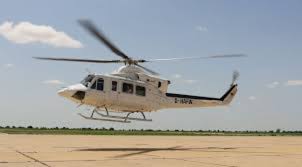A quiet but tense standoff has continued between the Ministry of Aviation and Aerospace Development and helicopter operators in Nigeria following the reintroduction of a $300 landing fee ordered by the Minister of Aviation, Festus Keyamo. The operators have unanimously refused to pay the fee, forcing the Federal Government to redirect the controversial charge to oil companies instead.
The disagreement has created a peculiar situation in the aviation industry where operators exchange pleasantries with the Minister at public events, while behind the scenes both sides remain locked in disagreement. Sources said that despite repeated engagements and attempts by the Ministry, operators stood their ground, insisting that the levy has no legal or economic justification.
The fee was first introduced in 2024 under a directive from the Aviation Ministry and was to be collected by a private contractor, NAEBI Dynamic Concept Limited, on behalf of the Federal Government. The memo mandated helicopter operators to pay the $300 charge at all aerodromes, helipads, airstrips, and oil platforms across Nigeria.
The policy had its roots in the Muhammadu Buhari administration when NAEBI Dynamic Concept Limited first secured approval from the then Aviation Minister, Hadi Sirika, to collect the landing fee from oil and gas service providers. At that time, the plan collapsed after operators rejected it, arguing that they already pay multiple levies for the same services.
In 2025, Minister Festus Keyamo revived the plan, sparking fresh controversy. The Nigerian Airspace Management Agency (NAMA) published an advertorial on June 24, 2025, directing operators to comply within seven days. The notice stressed that the enforcement of helicopter landing levies was consistent with global aviation practices under the International Civil Aviation Organisation (ICAO).
NAMA insisted that since 2022 it had written several times to oil and gas operators to comply with the provisions of the NAMA Act. The agency argued that helicopter landing levies are standard across many ICAO member states in Europe, Asia, and the Americas.
However, the Airline Operators of Nigeria (AON) rejected the directive, arguing that NAMA provides no additional services to helicopter operators at private helipads and oil rig platforms to justify the imposition of new fees. The operators said they already pay navigation fees to NAMA and also pay fees to private facility owners every time they land.
The AON spokesman, Professor Obiora Okonkwo, accused NAMA of violating ICAO’s policies on charges for airports and air navigation services, contained in documents 9082 and 9161. He added that the fee was inconsistent with Part 18 of Nigeria’s Civil Aviation Regulations, stressing that the charges lacked a proper legal framework.
After repeated resistance, Minister Festus Keyamo later announced that the fee would no longer be collected directly from operators but instead shifted to helicopter passengers, particularly oil companies. NAMA’s Director of Public Affairs, Abdullahi Musa, confirmed the change, saying Naebi Dynamic Concepts Limited had been instructed to invoice oil companies directly for the levies.
Musa explained that the decision aligned with a ministerial directive allowing Naebi to resume collections related to helicopter operations at oil fields, platforms, rigs, terminals, helipads, and aerodromes.
But oil companies appear unwilling to accept the charges. A source at Shell Nigeria said the company had once considered a response to the policy but abandoned it, describing the directive as “unthinkable.” Some officials in the oil sector privately told reporters that they have no intention of paying the fee, questioning why the Federal Government would attempt to shift the burden from operators to them.
Managing Director of Aero Contractors, Captain Ado Sanusi, openly opposed the levy, warning that it could open the door to arbitrary charges in the industry. “If it is $300 today, tomorrow it may be $500, and the next year someone may say it should be $1000,” he said. Sanusi, who once headed NAMA, added that oil and gas companies likely refused the charge because they recognised it had no real basis.
Three other operators, who spoke off record to avoid possible backlash, described the levy as an attempt to extort businesses under the guise of regulation. One operator said, “It is illegal, unprecedented, and a violation of ICAO rules. It is like someone asking you to pay for parking your car in your own garage.”
As of press time, oil company spokespersons declined to officially comment on the matter, but industry insiders suggested the notice would be ignored, leaving the government in another standoff with a critical sector of the economy.
For now, the controversy remains unresolved, with stakeholders questioning whether the fee can be enforced without crippling relations between the aviation ministry, helicopter operators, and the oil industry that depends on their services.
